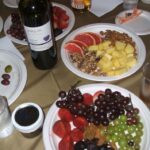Tu B’Shvat, which has become known as the Jewish New Year of the Trees, provides the perfect opportunity to host a sustainable and healthy celebration. Below are tips for hosting a sustainable seder, finding sustainable seven species options, and partaking in environmentally-friendly Tu B’Shvat themed activities.
SUSTAINABLE SEDER
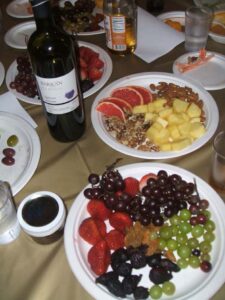
Host a sustainable Tu B’Shvat Seder. Joining family and friends, host a seder using the Hazon Tu B’Shvat haggadah
and sourcebook! Below are some suggestions on how to create an environmentally sustainable celebration.
Bake Sustainable Tu B’Shvat Challah. Get creative with your challah by adding one, or many, of the seven species. To get really creative, try decorating your challah with a free-formed pomegranate out of dough.
Serve local, organic wine. The Tu B’Shvat seder emphasizes the use of both red and white wines. Find out ahead of time what your local wine store has in stock—especially if you plan to buy a lot of bottles. If they don’t have anything, ask them to order a case for you. There aren’t many kosher organic wines available, but for options see our list of kosher organic wines. Consider paying a little more at a locally-owned store—sustainable means supporting local businesses, too.
Go Vegetarian! Tu B’Shvat is a great time to celebrate the environment and all of its natural offerings. What a better way to do that by eating vegetarian! For some great winter soup options, check out this great JCarrot article.Here are some creative vegan options.
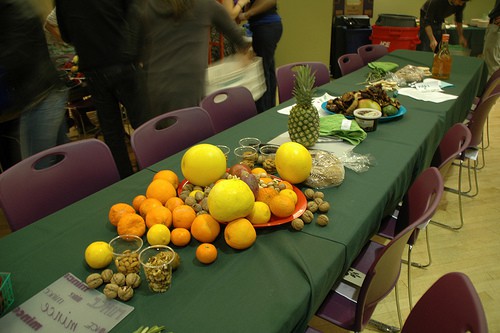 Eat Local. If you live in an area with a variety of seasonal, winter offerings, use this to your advantage by eating local. In the south, citrus fruits are in season and can provide a great addition to the Tu B’Shvat celebration: try citrus curls in your drinks, lemon curd for desert, or roast chicken with oranges and lemons inside
Eat Local. If you live in an area with a variety of seasonal, winter offerings, use this to your advantage by eating local. In the south, citrus fruits are in season and can provide a great addition to the Tu B’Shvat celebration: try citrus curls in your drinks, lemon curd for desert, or roast chicken with oranges and lemons inside
[myspacer]
Reuse and Recycle. In modern times, Tu B’shvat has been transformed into a holiday embracing nature, which allows us to focus our intentions on many environmental areas. In addition to supporting sustainable eating, try to cut down waste by using reusable, or compostable, dishes and recycle when possible. For resources and suggestions, visit the Hazon Food Guide.
Compost! Collect leftover fruit and vegetable scraps from your Tu B’Shvat seder and add them to your compost pile (or bring them to a composting facility). You’re kicking off the new year of the trees by contributing to soil fertility and the cycles of life!
SUSTAINABLE SEVEN SPECIES
For many people in the US, the seven species are not in season locally. If possible, buy organic varieties of the dried versions, and use some of the suggestions below to make your Tu B’Shvat more sustainable.
Wheat and Barley. To feature sustainable grains during your Tu B’Shvat seder, look to your local grain coop. In the New York area, Cayuga Pure Organics offers a wide variety of organic, sustainably grown products. Down south, Great River Milling offers whole wheat, organic flours perfect for baking a Tu B’Shvat challah. If finding a local grain coop isn’t an option, try to buy organic wheat flour or barley from artisanal companies such as Bob’s Red Mill or King Arthur Flour.
Grapes. Though grapes are not available seasonally in the winter, grapes come in many forms! Try serving an organic wine at your seder, in addition to grape jellies and raisins.
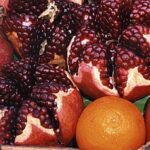 Figs, Pomegranates, and Dates. For most people in the United States, figs and pomegranates aren’t available locally in the winter. Instead of offering fresh varieties of figs and pomegranates, opt for jam, jellied, or dried forms. If you can get your hands on some fresh figs, try preparing this “fig newton” recipe that is a healthier alternative to the store bought version. For United States grown dates, check out Sun Date’s offerings, which are grown locally in California. Negev Nectars offers a variety of products, including pomegranate jam and dried dates that will help to enhance your Tu B’Shvat celebration.
Figs, Pomegranates, and Dates. For most people in the United States, figs and pomegranates aren’t available locally in the winter. Instead of offering fresh varieties of figs and pomegranates, opt for jam, jellied, or dried forms. If you can get your hands on some fresh figs, try preparing this “fig newton” recipe that is a healthier alternative to the store bought version. For United States grown dates, check out Sun Date’s offerings, which are grown locally in California. Negev Nectars offers a variety of products, including pomegranate jam and dried dates that will help to enhance your Tu B’Shvat celebration.
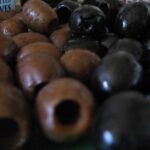 Olives. Believe it or not, the peak of the olive season in the United States is during the winter! Olives are harvested from November to January in California. In California, The California Olive offers a wide variety of oils featured at local farmer’s markets. For a great, kosher olive oil and other olive products, we recommend supporting Negev Nectars.
Olives. Believe it or not, the peak of the olive season in the United States is during the winter! Olives are harvested from November to January in California. In California, The California Olive offers a wide variety of oils featured at local farmer’s markets. For a great, kosher olive oil and other olive products, we recommend supporting Negev Nectars.
[myspacer]
TU B’SHVAT THEMED ACTIVITIES
Celebrate the trees! Tu B’Shvat is often viewed as the New Year of the trees, so take th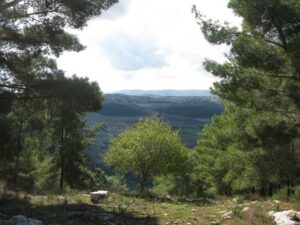 is opportunity to celebrate the nature that surrounds you! For a fun family or community activity, take pictures of trees in the winter and see if you can identify the trees without their leaves. Since Tu B’Shvat can be viewed as a “birthday” of trees, find the age of trees in your yard or neighborhood by using this calculation tool.
is opportunity to celebrate the nature that surrounds you! For a fun family or community activity, take pictures of trees in the winter and see if you can identify the trees without their leaves. Since Tu B’Shvat can be viewed as a “birthday” of trees, find the age of trees in your yard or neighborhood by using this calculation tool.
Test your environmental impact. Use Tu B’Shvat to test your knowledge on local, environmental issues. Allow Tu B’Shvat to open a door to finding more about your local habitat and ways to be more environmentally friendly and sustainable.
Do you have a great suggestion for hosting a sustainable seder or environmentally-friendly Tu B’Shvat themed activities? Leave them in the comments!
